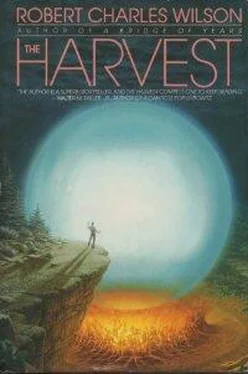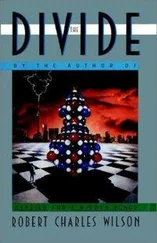The God Damn Noise had begun a little after six o’clock. It was innocuous at first, almost a whisper; then above that, as the velocity of the wind increased, came an intermittent keening note—eerie, but bearable.
Then the whisper rose to shouting volume, the sound of a bathroom shower running full tilt. And other noises began to creep in along the columns of hammered tin, in particular a low wail that made Abby think, uncomfortably, of a crying child; and periodic creaks and pops, as of sheet metal stressed beyond its tolerance.
She endured that… though it made her feel absurd, serving Oreos and lukewarm coffee to six individuals huddled knees-to-chest on hospital mattresses on a cold linoleum floor. Pollyanna in a pantsuit. She felt like a jennyass, frankly.
But then Bob Ganish began to complain of claustrophobia: It was too close in here, he insisted, especially with the fluorescents out and the damn battery lanterns casting such a dreadful low light—seemed like the air had gone bad. So Abby had to sit with him and share her cookies and change the subject. Hey, what was the best sale he ever made down there at Highway Five Ford? The drop-dead pinnacle of his sales career? And Bob smiled nervously and launched into a description of the near-criminal flogging of a used 1990 Pinto. The monologue lasted twenty minutes, by Abby’s watch, including details on the financing. All the while the ducts screaming and Abby beginning to feel that Ganish’s hysteria, by some reverse osmosis, was draining into her.
Okay, all that, and Dr. Wheeler still out in the storm…
But then the wind made a sound that was, in Abby’s imagination, precisely the sound the last T. Rex might have made, dying in a pool of hot Cretaceous mud…
(—her grandson Cory had been a dinosaur buff—)
…and to top it all off, that was the moment Paul Jacopetti picked to have his goddamn heart attack.
* * *
Abby was startled by the sudden commotion of voices. She turned away from Bob Ganish, spilling her coffee onto his pant leg. (“Ouch, Abby, hey!”)
Jacopetti lay face-up on his mattress, his hands clutched over his chest. His face was pale, and he was breathing rapidly, wheezing.
Worse, everyone seemed to expect Abby to do something about it.
She hurried to Jacopetti’s mattress and crouched over him. “Paul? What is it?”
“I’m having a fucking heart attack,” he gasped, “what does it look like!”
Her first impulse—she was instantly ashamed of it—was to slap him. Tell him: Not now! This isn’t the time or the place, you idiot. Have your heart attack later.
Instead she asked, not too intelligently, “Does your chest hurt?”
“ Yes, it hurts. Hurts like a son of a bitch.” He closed his eyes and grimaced.
Abby looked up. Everyone had gathered in a circle around the mattress, their attention on Jacopetti, or worse, on her. The ventilator ducts screamed. Abby heard the sound of a window breaking, perhaps up on the second floor, a nerve-wrenching sound conducted directly into her eardrums.
She said, half to herself, “I don’t know what to do.” Then, as the last buckles of restraint broke loose, louder: “I don’t know what to do! Stop staring at me!”
She felt a hand on her shoulder, gently pulling her aside—Beth Porter’s hand.
Abby bit her lip but retreated from the mattress. Dazed, she watched Beth kneeling over Paul Jacopetti. “Mr. Jacopetti?” Beth said. “Mr. Jacopetti, can you hear me?” He opened his eyes. “You… what do you want?”
“Mr. Jacopetti, you have to tell me what’s wrong.” Perhaps the pain had gotten worse—Jacopetti seemed suddenly more malleable. “Chest hurts.”
“Show me where,” Beth said.
Jacopetti raised his right hand and drew a circle on his shirt above the breastbone.
“There in the center?” Nod.
“How about your arm? Does your arm hurt at all?”
“No.”
“How about your breathing?”
“Tight.”
Gendy, Beth levered back the man’s head so his chin jutted up. “Mr. Jacopetti, I know this is a personal question, but are those false teeth?”
“Dentures,” he managed. “Why?”
“Can you take them out? In case you fall asleep or anything. It’s safer. Or I can take them out for you.”
Jacopetti pried out his teeth. Abby had always been a little frightened of this man—his barrel-shaped body, his booming voice, his invincible cynicism. But Jacopetti without his teeth looked altogether less threatening. His cheeks seemed to collapse inward, giving him an old man’s gummy frown.
Jacopetti looked up at his audience. “Thuck you,” he said/Thuck all oth you.”
“We could use some more light,” Beth said hurriedly. “Maybe if everybody would just sit back down?”
They did, though Abby stayed close, mad at herself for failing this test. If it hadn’t been for the noise…
“Mr. Jacopetti,” Beth said, “are you nauseated?”
Nod.
“Feel like you might throw up?”
“Maybe.”
“Could somebody fetch a towel just in case?” Chuck Makepeace dashed for the bathroom.
“Mr. Jacopetti, listen to me… Did you ever have this pain before?”
“Not as bad.”
“But you’ve had it before?” Nod.
“Seen a doctor about it?”
“No.”
“It always went away?” Nod.
“Okay,” Beth said. “That’s good. I think what you have isn’t a bad heart attack. I think it’s angina. It’ll probably pass if you lie still.”
Joey Commoner, leaning against the wall with a strained expression, said: “How would you know?”
“Hush,” Abby told him, and got a sullen glare in exchange.
Bob Ganish, his claustrophobia forgotten—misplaced along with his common sense, Abby thought—offered: “This man should be in a hospital.”
Jacopetti: “I am in a hothpital, you athholel”
Ganish reddened. “I mean, he needs proper medical attention.”
Abby took the salesman aside a second time. “I know he does, Bob, but our proper medical attention seems to be lost in the storm. Let’s sit down, shall we?” She looked at her watch. Seven-forty-five. How much worse could this weather get? Much worse, she supposed. The eye, the Helper had told her, would probably pass directly over Buchanan, possibly around midnight. And that was only half the storm.
“I wish,” she muttered, “somebody would turn off this goddamned noise.”
* * *
Matt felt as if he had fallen into some peculiar time warp: The smaller the distance between himself and his destination, the more slowly he was forced to proceed.
The enemy wasn’t so much wind—though that was bad enough—nor even Miriam Flett’s relentless backseat driving. The enemy was visibility. More precisely, invisibility.
All traces of daylight had passed. The rain was continuous and dense as fog. It carried with it tiny particles of salt and something else, a crystalline dust, some sort of sea life, Matt presumed. The effect of this was to obscure his vision so completely that he turned onto Campbell Road, the direct route to the hospital, without any certainty that he had chosen the right intersection. There were no landmarks, nothing perceptible beyond five or six feet from the car even in the high beams. He drove hugging the right side of the road, scanning for the sign that marked the entrance to the hospital, then worrying that he’d passed it—maybe it was set too far back from the tarmac.
A particularly strong wind rocked the car up on its right-hand wheels; Miriam sucked in her breath. “I should have stayed home!”
Читать дальше












